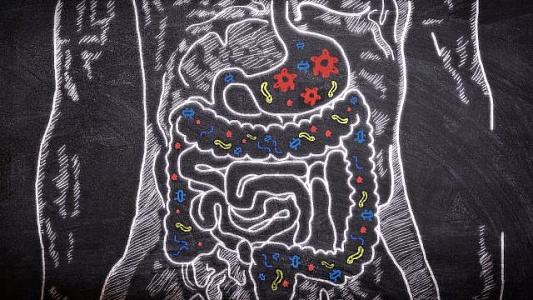
Gut feeling: A link between bacteria and Alzheimer’s disease
Scientists have known how important a healthy gut is for our bodies — specifically for our immune systems — for a long time. However, we are now realizing how important it can be for our mental health, as well. Not only can our gut health be a trigger for anxiety, stress, or depression, but it may even be an indicator of Alzheimer’s disease. In fact, a new study from the University of Geneva in Switzerland confirmed that an imbalance in the gut microbiome is linked to the development of amyloid plaques (misfolded proteins in the brain), which are a hallmark sign of Alzheimer’s disease. The study was published in the Journal of Alzheimer’s Disease in November 2020. Let’s look at what the authors discovered.
Our Bacteria Produce What?
The researchers studied a group of 89 adults with Alzheimer’s disease, other neurodegenerative diseases, or adults with no memory issues who served as “healthy controls” in the study. They used a positron emission tomography (PET) scan to identify the number of plaques present in each individual. They also measured inflammatory markers produced by intestinal bacteria in the subjects’ blood. These included lipopolysaccharides (LPS), which are inflammatory molecules from bacteria that have been linked with Alzheimer’s and chronic gut inflammation, and also short chain fatty acids (SCFAs). SCFAs are also produced by our gut bacteria. The authors found that people with higher levels of LPS and two specific SCFAs had more plaques, while one type of SCFA correlated with less plaque. Overall, their findings suggest that inflammation caused by gut bacteria could be connected to plaques in Alzheimer’s disease; although, this is just a correlation, and we cannot be sure of cause and effect.
You’ve Gut to Eat your Veggies
If bad gut bacteria are producing pro-inflammatory molecules that might be involved in Alzheimer’s disease, what can we do to prevent this? Well, the researchers are working to identify which specific bacteria are producing these pro-inflammatory markers. Knowing the strains of bacteria that produce the inflammatory LPS and SCFAs could help with early identification of Alzheimer’s disease. Until then, we can only continue to keep our guts healthy and happy, which makes inflammatory bacteria less likely. The best ways to do this are to keep stress levels low when possible, get enough sleep, drink enough water, and eat a varied diet. Eating fruits and vegetables are important, but it is also good to include fermented foods, such as yogurt or kimchi. These foods contain “good bacteria” which benefit your gut. It is always best to consult your doctor when changing diets, but there are many great resources which can help improve your gut health. And you can always browse our “Nutrition” articles here on the Center for Healthy Aging Blog for more ideas!
ABOUT THE AUTHORS
Meghan Jeske is a senior graduating in December 2020 with her B.S. in Health and Exercise Science and minor in Biomedical Sciences from CSU.





